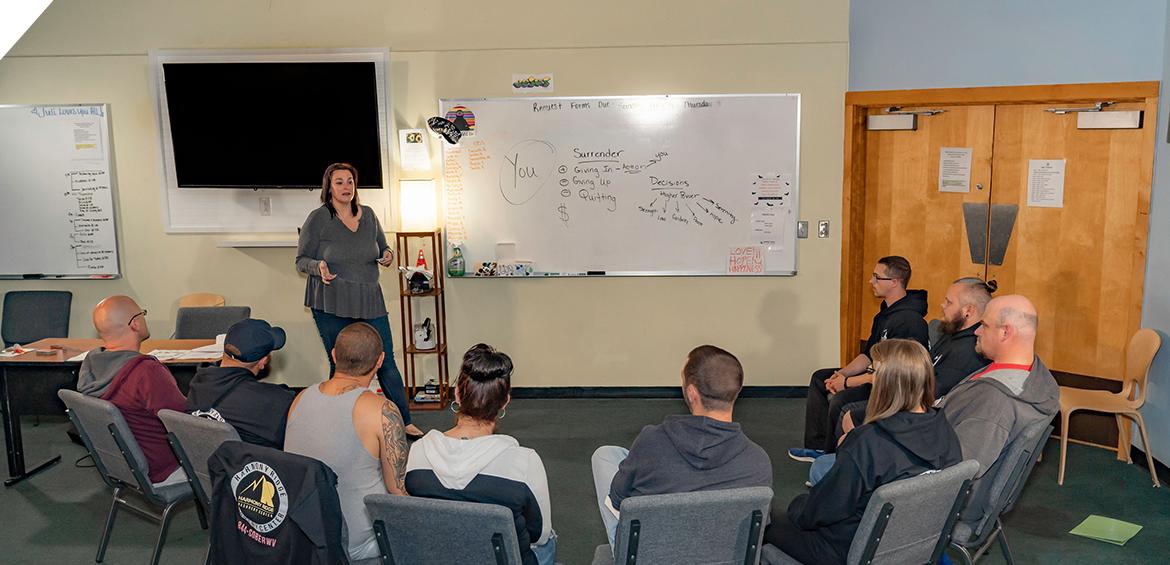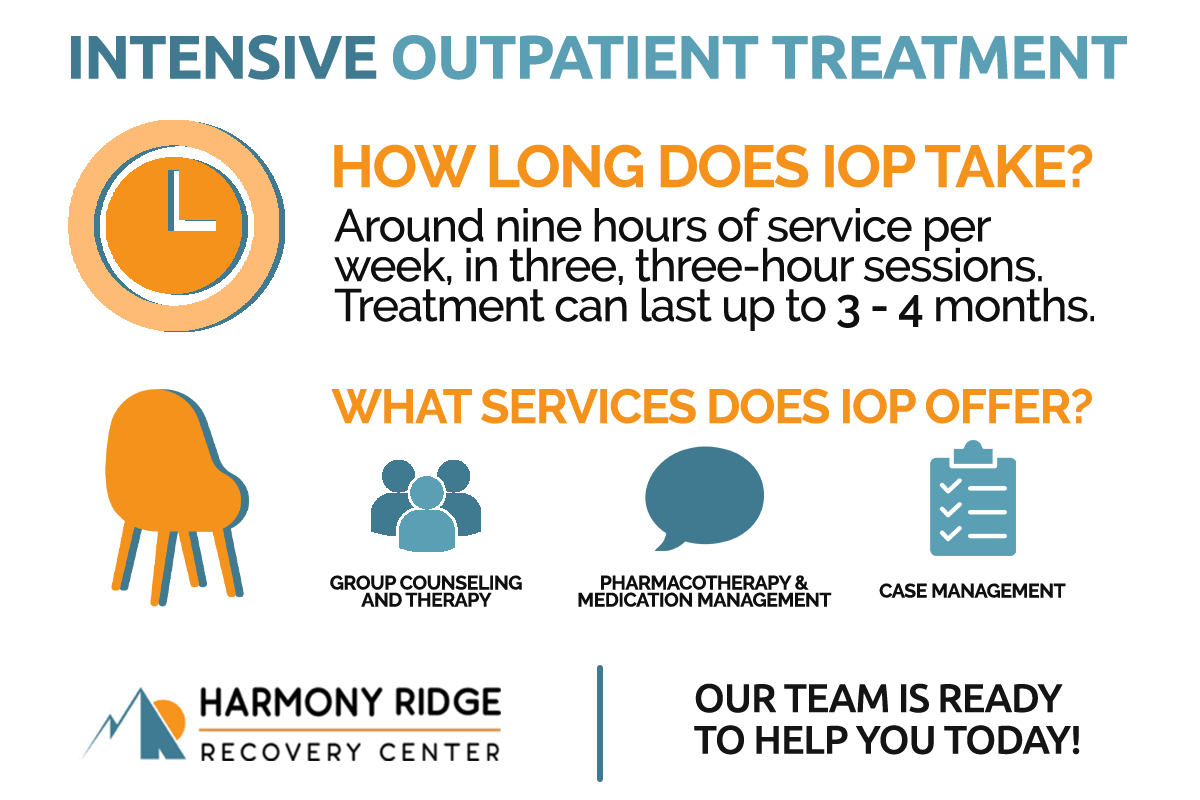Intensive Outpatient Program
Our intensive outpatient program is designed to provide flexible and effective treatment options for individuals seeking recovery. It combines therapy, counseling, and support, and offers comprehensive care while letting you maintain your daily commitments.
If you’ve been looking for an Intensive Outpatient Program West Virginia has to offer, chances are you have seen this for yourself. Drug addiction is, unfortunately, the increasingly common end result of drug abuse and substance abuse disorders (SUDs). This has become so prominent in the US that it has now been declared, and is treated as, an epidemic.
Still, there can be no universal solution; each case of addiction has different roots to address. Each individual has different underlying conditions, and thus different needs. For this reason, we at Harmony Ridge Recovery fully embrace the need for rehab personalization. Our comprehensive drug and alcohol addiction treatment options include intensive outpatient programs (IOPs), for those who need intensive care but cannot, or should not, opt for inpatient programs.
When a longer stay in residential treatment is not possible or necessary, IOPs have long been a way to continue addiction treatment. IOPs also serve as a step-down from intensive treatment that lasts all day or longer, such as inpatient treatment, residential treatment, or partial hospitalization program (PHP) treatment.
Crafting coping strategies enrich your chances for recovery. As a part of a continuing care program, IOPs have proved to be immensely beneficial in the realm of behavioral health. They are direct treatment services for people with substance use disorders or co-occurring conditions who don’t require 24-hour supervision.
IOPs are designed to provide behavioral, psychological, and social support therapies to patients while they continue to live at home. This allows patients to continue to participate in educational, work and family activities while still attending treatment at a facility in the morning or at the end of the day.
The Admission Process
Here, we will briefly outline the admission process. If you do conclude we’re the best rehab for you, you will need to be informed in advance – and this first step forward can sometimes discourage people. It may seem scary or intrusive, but it needs to be neither.
First, you may contact our representatives at (855) 942-3797. Alternatively, you may fill out our admission form, in which case we’ll come in contact with you. In either case, once we do come in contact, our representatives will:
- Ask clear, specific questions surrounding your addiction. You can expect discretion and empathy; many of us have had our close bouts with addiction, so we understand.
- Explain the available programs that may best fit your needs. Every journey to recovery is a commitment, and you may have other obligations. Our recommendations will reflect this, and together we’ll find the program that best suits you.
- Explore your financial options. Every rehab comes with a cost, which we understand may seem daunting. Our representatives will review your insurance plan and recommend ways you may finance your recovery.
- Explain which items you may bring. Many personal items may be therapeutic, and we highly encourage that you do bring such items with you. Others are prohibited, however, as they might inhibit your recovery.
- Make arrangements. Once everything is in order, we will make arrangements for your travel and relocation to our facilities. It’s never pleasant to make such arrangements yourself, and we understand that well.

Harmony Ridge Programs
Past the admission process, our programs come with a different focus, treatment settings, and intensity. They do follow the typical rehab recovery structure; they begin with detox, proceed to treatment, and conclude with aftercare. However, offering different programs for the middle stage allows us to better personalize your recovery, and best tailor it to your needs.
In order, our programs are as follows.
#1 Detoxification
The very first step for most addicts is detoxification. It is a crucial part of rehabilitation in which it allows the individual to cleanse their body of the substances they’re addicted to, and proceed with treatment.
This stage can be quite challenging for many. Withdrawal symptoms and cravings are often too severe to handle naturally, and for this reason we strongly recommend medication-assisted treatment (MAT) whenever necessary. In combination with consistent counseling, therapy sessions, psychiatric supervision, and medication management, our detox stage should be as painless, comfortable, and safe as possible.
#2 Residential program
With detox in order, the first step of treatment for more severe cases comes in our residential program. This program is typically best for those who require hospitalization, and can afford to dedicate all their time to treatment.
Our residential program requires that you live within our residential facilities for its duration. As you do, you will be given a daily schedule to follow, and will receive daily treatment at our clinical building. Throughout the program, you will be under medical supervision, and will have 24/7 access to all relevant staff for support. Once you have made sufficient progress, you may conclude the program; exact durations will vary considerably.

#3 Intensive Outpatient Program (IOP)
Once you complete a residential program, or should your case require less clinical care to begin with, you may next consider our IOP. IOPs typically serve as the middle ground between intensive care and autonomy, as you won’t require 24-hour supervision or have strict daily routines to follow.
Because IOPs typically outline decent progress, they can afford to specifically focus on the deeper underlying conditions that may fuel addiction. Sessions last for approximately 2 to 4 hours a day, 3 to 4 days a week, and will focus on:
- Individual therapy sessions; personal settings tend to allow individuals to best open up and express themselves. Should a mental health disorder also be present, dual diagnosis treatment will also occur at this stage.
- Group therapy sessions; in contrast, group dynamics allow the individual to socialize and vocalize their struggles. This essential part of all therapies adheres to 12-step program modules – following AA’s guidelines for alcohol addiction, and being inspired by them for drug addiction.
- Pharmacotherapy; finally, some medication may still be necessary to treat addiction symptoms themselves or underlying conditions. Despite moving away from clinical settings, our IOP takes utmost care to provide such support as well.

What Comes After Intensive Outpatient Program West Virginia?
All of our programs will begin to build an individualized relapse prevention plan. During them, you will acquire:
- Trigger management skills; coping with cravings is a prevalent challenge, both during and after treatment. Our therapists will focus on helping you identify, avoid, and manage addiction triggers in your everyday life.
- Nutritional education; malnutrition is often present in addictions, and can inhibit recovery. To maintain a healthy body post-rehab, you will receive nutritional education to remain self-sufficient.
- Improved self-reliance; each case of addiction differs, but most cases of relapse have poor mental health and self-reliance in common. After physical healing concludes, our programs strongly focus on psychological and emotional healing to boost your resilience and allow you to thrive post-rehab.
These principles culminate into our aftercare program, which will build on those foundations. Through it, you will be able to socialize with your peers and continue attending therapy sessions if you need them. You will maintain open communication channels with our therapists, and you will be encouraged to join alumni programs and find a sponsor. These and other therapeutic frameworks will strive to allow you to remain abstinent, sustaining the new life you have earned.
The 4 Stages of Alcohol and Drug Rehab Recovery
Going through them in order, perhaps you have noticed that all our programs seek to progressively cater to the 4 stages of rehab recovery. This is, of course, no coincidence; from the best intensive outpatient program West Virginia has to offer to supportive aftercare, our licensed medical professionals and therapists will personalize each and every recovery along these lines of progress.
To make this section easier to understand, here we will use VeryWellMind’s classification of these stages:
- Treatment initiation
- Early abstinence
- Maintaining abstinence
- Advanced recovery
In order, these correspond to the following steps of our programs.
- Treatment initiation; detox. First, treatment initiation begins with detoxification. For this step, our medical detox center will offer a safe and welcoming environment, where your body can flush away the addictive substances.
- Early abstinence; personalized care. With detox concluded, early abstinence begins with rehabilitation programs. Here, you will be admitted to any of the above programs depending on your unique needs and the levels of care you require.
- Maintaining abstinence; case management. As you achieve initial abstinence, the next challenge lies in maintaining it. To help you meet it, all of our programs focus strongly on case management, which ensures you receive exactly the support your unique case requires.
- Advanced recovery; relapse prevention and aftercare. Finally, once your rehabilitation concludes successfully, you will likely require aftercare to remain abstinent. Relapse prevention is a fundamental part of all our programs, which aftercare champions.

Types of Addictions We Treat
Simply put, a key reason for our keen focus on personalization is that there are so many different addictions. In addition to highly personal factors, such as addiction severity and duration, each substance requires a different approach to handle.
To address this, we at Harmony Ridge Recovery offer treatment for a wide array of addictions across our programs. From inpatient programs to our intensive outpatient program West Virginia trusts, we treat the following:
- Alcohol; an increasingly prevalent addiction with its unique cultural challenges, alcohol addiction can be just as destructive as any drug addiction.
- Ambien; approved by the FDA to treat insomnia and other sleeping problems, Ambien can still be highly addictive.
- Barbiturates; popular, but equally addictive depressants which treat insomnia, anxiety, and other physical and mental ailments.
- Benzodiazepines; another type of depressants which treat an array of mental and sleep disorders, Benzodiazepines also carry a high risk of addiction if misused.
- Opiates; the subcategory of opioids which spearheads the ongoing nationwide opioid crisis, opiate addiction is among the most common drug addictions today.
- Fentanyl; a synthetic opioid whose primary medical use is as a painkiller, Fentanyl is very prone to misuse as well.
- Stimulants; a broader drug category, primarily used to treat ADD and similar disorders, stimulants include a variety of drugs which can become highly addictive. This category includes household names like Adderall, Ritalin, Concerta, and others.
- Marijuana; legal in some states and illicit in others, marijuana can also fuel addictions beyond its medical uses.
- Cocaine; an illicit drug and a known stimulant, cocaine is a highly addictive substance which can seriously endanger the individual.
- Heroin; with over 800,000 Americans having reported past-year heroin use in 2018, and that number being estimated to have increased since, heroin is a very potent and highly dangerous substance to become addicted to.
- Meth; among the most commonly used illicit drugs, Methamphetamine is extremely addictive as a potent stimulant.
The Importance of Holistic Therapy
In addition to the above, we at Harmony Ridge Recovery offer expansive holistic therapy across all of our programs. We firmly believe that the mind needs to heal alongside the body, and holistic therapy principles allow us to put this belief into practice. It is this focus that makes us confident we can provide the best, most efficient intensive outpatient program West Virginia has to offer.

Still, holistic therapy may sound hollow or may be contested. Indeed, public discourse doesn’t paint it in the most flattering light quite yet. However, research does, so here we may go through it.
What is holistic therapy?
First, let us briefly define holistic therapy to explain our related offerings. Holistic therapy holds that the body and mind are indivisible, and they both need to heal simultaneously. The American Psychological Association calls this the “mind-body meld”, and cites a study that should begin to prove its efficacy:
“Researchers at Boston University School of Medicine and McLean Hospital used magnetic resonance imaging to compare levels of the neurotransmitter gamma-aminobutyric acid (GABA) before and after two types of activities: an hour of yoga and an hour of reading a book. The yoga group showed a 27 percent increase in GABA levels, which evidence suggests may counteract anxiety and other psychiatric disorders.”
Yoga is not alone in this principle. It may be the most famous and most studied, but will typically come alongside holistic therapy types like:
- Art therapy
- Biofeedback
- Guided meditation
- Reiki and tai chi
- Spiritual therapy
Does holistic therapy work for an intensive outpatient program West Virginia?
With definitions in order, here we can discuss the crucial part; its efficacy. First, we may note that the National Institute of Health (NIH) explores “complementary and integrative health approaches”, which very closely align with holistic therapy principles. NIH’s research on the subject should offer some initial reassurance:
- National Health Interview Survey (CDC and NCCIH)
- National Health and Nutrition Examination Survey (CDC)
- National Home and Hospice Care Survey (CDC)
Next, we may cite other health professionals to further illustrate its effectiveness.
- VeryWellMind asserts that “[holistic therapy] often incorporates other empirically validated therapies such as CBT and brief dynamic psychotherapy”. In addition, they assert that “techniques such as acupuncture, yoga, and deep breathing have also been effective for many purposes”, citing research which corroborates this point.
- HealthLine also notes that “there’s an emerging and growing body of research around the benefits of holistic therapy”. To illustrate this, they cite ample peer-reviewed research that “suggests that holistic therapy can help improve overall mental well-being and may offer benefits”.
- The Australian & New Zealand Mental Health Association supports holistic therapy as well. They assert that it can facilitate introspection, “address any underlying causes of your mental health problems”, and “help you find new ways of coping with stress or negative feelings”, among other benefits.

Relapse is Not The End of Recovery
Despite the positive effect holistic treatment can have for many, relapse is sadly quite common. Chronic relapse is a very existent phenomenon, which requires due care. Unfortunately, even the most robust aftercare programs may not prevent a return to addiction.
The National Institute on Drug Abuse (NIDA) quantifies relapse rates for substance use disorders (SUDs) at 40-60%. This figure does show some signs of slowly decreasing as new treatments emerge, but will likely remain high for some years to come.
What must be stressed here is that relapse does not signify a failed recovery. NIDA explains that “the chronic nature of addiction means that for some people relapse, or a return to drug use after an attempt to stop, can be part of the process”. They continue to assert that “relapse serves as a sign for resumed, modified, or new treatment”.
This we have to agree with as well. These rates may seem discouraging, but relapse can serve as just another step to recovery. We have seen this unfold many times before, from both our inpatient and intensive out patient programs, here in West Virginia. Every time, it was our patients’ persistence and resolve to retry that eventually paved the way to success.
In brief, relapse can be a natural step of the process, as you finally solidify your abstinence from substances and reclaim your life. It should not dismay you, but only strengthen your resolve – and we will be there to support you if it happens.
What Makes Our IOP Stand Out From the Others?
Having covered our programs and addiction treatments, here we may finally explore what may make Harmony Ridge Recovery the ideal ally for your journey to recovery. In regards to our IOP specifically, here are 3 key features that make it the intensive outpatient program West Virginia trusts.
#1 Treatment Tailored To Your Needs
All of our programs offer an expansive array of therapies. If one does not yield the best possible results, we will explore another – or selectively apply the principles of the ones which do resonate with you.
Considering the nature of addiction, behavioral health services are a key to recovery. IOP treatment can be used to treat the following disorders:
- Bipolar disorder (including mania)
- Unipolar depression
- Eating disorders
- Self-harm
- Substance use disorders
- Transitional treatment for patients just released from psychiatric or residential treatment
Toward this end, we offer traditional therapies like:
- Individual therapy, where private sessions can allow you to safely and comfortably open up about your rehabilitation challenges.
- Group therapy, whose group dynamics will allow you to socialize and vocalize your concerns to your peers.
- Family therapy, where you and your loved ones can begin to mend your relationships and establish aftercare foundations.
- Art therapy, as a means of therapeutic self-expression to facilitate better emotional recovery.
- Motivational interviewing, which centers on you and your needs instead of your therapist’s external view.
In addition, and particularly in cases of dual diagnosis, we also offer various types of psychotherapy, including:
- Cognitive Behavioral Therapy (CBT); the golden standard of addiction psychotherapy today, this type combines cognitive and behavioral therapy principles. It also informs other therapy types in its own right.
- Dialectic Behavior Therapy (DBT); better known as “talk therapy”; this type also enjoys some fame and appeal among professionals. It primarily centers around developing coping mechanisms, which will also help strengthen aftercare programs.
- Rational Emotive Behavior Therapy (REBT); a type of psychotherapy strongly influenced by CBT, this type also centers on cognitive and behavioral healing.
- Eye-Movement Desensitization and Reprocessing (EMDR); a very prominent emerging therapy type, EMDR consists of 8 robust phases of therapy. Its primary focus lies in recovery through disassociation, influenced by behavioral therapy.

#2 A Place of Serenity – Surrounded by Gorgeous Mountains of West Virginia
The second differentiator from programs of our peers is our unique location. Unlike dense and busy cityscapes, our facilities are surrounded by the idyllic West Virginia countryside. Since pictures are worth a thousand words, you may visit our photo gallery to see its beauty for yourself.
Needless to say, such locations do wonders for one’s mental wellbeing. For everyday life they offer serenity, allowing you to reconnect with nature and your inner self. This is not simply our own view, but a documented scientific fact; among others PsychologyToday finds there are ample benefits of such settings to rehabilitation.

In addition, our location allows for several therapeutic activities, such as picnics and group outings. Simple walks through nature can offer a wealth of psychological benefits, WebMD finds, such as:
- Improved sleep
- Stress relief
- Improvement in mood
- Increased energy and stamina
- Increased mental alertness
#3 Insurance Policies That Can Cover Your IOP at Harmony Ridge
Unlike many of our peers, we deeply understand that rehab costs may be a serious burden on many families. Especially in such financially trying times, our philosophy mandates that we make our programs as affordable as possible.
Our intensive outpatient program West Virginia most prefers accepts the following insurance providers:
Still, it’s noteworthy that your plan’s exact coverage may still vary. The Affordable Care Act and the Mental Health Parity And Addiction Equity Act (MHPAEA) do mandate that all plans cover behavioral health treatment, mental and behavioral health inpatient services, and SUD treatment. However, factors like addiction duration, prior addiction history, treatment duration, and exact services required may factor into final costs and coverage.
An outpatient treatment program is generally more affordable. If you’re considering outpatient treatment, but don’t feel confident in the recovery process, you have additional options. The average length of treatment at an outpatient treatment program is 30 days, but this depends on your recovery timeline.
The benefits of standard outpatient programs include psychotherapy and detoxification (or medication-assisted treatment). Treatment services may vary.
This is when you want to look at a more intense treatment for drug abuse. Behavioral health treatment works as a shield for substance abuse treatment. Early recovery is attainable through alternative therapies. One such alternative would be intensive outpatient program treatment (IOP). But, what is IOP treatment, what does it treat, and is it the right form of treatment for your situation?
What’s the Difference between Residential Treatment and Outpatient Treatment?
Treatment programs operate at 4 levels of care. Residential treatment for substance abuse typically provides inpatient care for recovering individuals in need of long-term treatment.
Residential treatment offers a distraction-free environment to those who do not have a strong enough support system to live at home during the time period that they’re receiving substance abuse treatment. You may consider residential treatment for the structured approach.
The amenities of inpatient programs will vary depending on the location and services offered. Inpatient care offers round-the-clock addiction treatment for those in need of medical support and psychotherapy. The cost is generally more for inpatient facilities, however, payment options for inpatient care are available.
It’s best to check what inpatient treatment offers, especially if substance abuse has affected your mental health. Also, remember that the length of addiction treatment plays into your recovery process. Inpatient treatment can last from 30 to 60, to 90 days.
Compared to residential treatment programs, outpatient treatment programs are shorter and less intensive, yet effective. An intensive outpatient program functions as the middle ground for substance abuse recovery.
Intensive outpatient program treatment is usually specialized and easily accessible. Partial hospitalization programs (or day programs) offer a similar structure to residential treatment programs except that PHP patients get to spend their evenings and nights in their own homes.
Contact Harmony Ridge Today!
The first step toward achieving recovery is to reach out to one of the rehabs in WV that can get you on the track to recovery. Our admissions team is available 24 hours a day, 7 days a week, 365 days a year. Give us a call today!
Contact Us TodayWhat Is The Purpose Of An IOP for Substance Abuse?
Many treatment facilities offer IOPs for substance abuse. Such programs are ambulatory services for people with substance use disorders (SUDs) who don’t meet the diagnostic standards for residential or inpatient treatment.
Intensive outpatient program treatment is also appropriate for people who have been discharged from 24-hour care in a residential facility. The treatment process of the continuum of care adapts to the different stages of substance abuse. Therefore, individuals that attend IOP treatment after already receiving residential or inpatient treatment still need more support than the weekly or bi-weekly sessions typical of traditional outpatient programs.
A psychiatric intensive outpatient program is aimed at patients who have primary mental health issues. A dual diagnosis intensive outpatient program is for patients who have difficulties with drug and/or alcohol dependence along with mental health issues.
Participants in IOPs have the chance to use evidence-based therapy to be able to recognize and understand problematic patterns in their lives. Behavioral health services in IOP treatment are also typically evidence-based.
How Long Does IOP for Substance Abuse Treatment Last?
IOP treatment typically offers a minimum of nine hours of service per week, in three, three-hour sessions. It’s recommended to research the treatment center you wish to admit yourself into IOP treatment at.
The length of treatment in IOP is usually three to four months. Lengthier programs may be needed for patients with more serious addictions. When a person completes an intensive outpatient program for addiction, he or she will continue to add outpatient therapy sessions for several more months and up to a year after.
What Services Does An IOP Offer?
There is a set of core services essential to all intensive outpatient programs. These are standard services offered to every patient at a treatment center. Enhanced services such as child care or arranging transportation may be offered at some facilities based on individual needs.
Some of the core services offered by an IOP include:
Group Counseling And Therapy
Groups form the most important part of most intensive outpatient programs. Recent studies have shown that for relapse prevention training, the group therapy method is as effective as one-to-one therapy. Group counseling allows programs to reduce the cost compared to the more expensive individual counseling.
Group Therapy Supports Patients By:
- It provides a chance for clients to develop better communication skills and socialization experience. This is particularly useful for patients whose socializing has typically revolved around using drugs or alcohol.
- The group experience creates an environment where patients help, support, and confront one another when necessary.
- Group therapy helps introduce structure and discipline into the lives of patients whose lives are often chaotic and undisciplined.
- It provides norms that bolster healthy ways of interacting in a supportive and safe, healing environment that is necessary for recovery.
- Personal recovery can be enhanced for group members who are further along in their recovery, who can then help other members.
- Group members can exchange new information, teach new skills, and guide other members as they practice new behaviors.
- It offers different types of groups throughout treatment to address different skills.
Types Of Groups Are:
Psychoeducational
These provide a supportive place where patients can learn about SUDs and their consequences. They typically occur early in treatment and are low-key instead of emotionally intense. Relapse training is also provided.
Skills development
These groups provide the opportunity to practice behaviors within the safety net of the treatment setting. Skills development includes drug or alcohol refusal training during which patients act out situations of refusing the offer. Skills development also includes relapse prevention techniques in which patients analyze the triggers and high-risk situations for substance use and ways to avoid them.
Assertiveness training teaches patients the differences between aggressive, assertive, and passive behavior. Patients of assertiveness training are encouraged to practice being assertive.
Stress management helps patients recognize situations that might cause stress. It also helps patients learn healthy techniques to respond to stress. This is because stress can deteriorate a patient’s mental health and chances for recovery.
Support groups combine patients in the same recovery stage, who are working on similar issues. They practice changing negative thinking, tolerance, conflict resolution, and examining how one person’s actions affect the group.
Interpersonal process groups either focus on a single issue of personal importance such as gender, sexual orientation, or sexual abuse. This is because trauma can affect a person’s mental health. Interpersonal process groups may also be families or couples groups that assist patients in learning about the effects of substance use on family members and significant others.
Individual Counseling
In IOP, individual counseling is an important complement to group therapy. Mental health conditions are a common element in substance abuse. However, psychiatric interventions and addiction counseling are suitable for patients with co-occurring substance abuse and mental health disorders. This is called a dual diagnosis.
Generally speaking, counseling in IOPs addresses the current problems created by the patient’s substance use disorder and their present efforts to achieve and maintain sobriety. A 30- to 50- minute counseling session is typically scheduled at least weekly during the initial treatment stage. A primary counselor is also assigned to the patient to build a collaborative relationship.
Individual therapy is recognized as a more intimate approach to treat mental illness. It’s vital to develop a relationship with your counselor in individual therapy.
An individual counseling session usually consists of the counselor bringing out the patient’s reactions to group meetings. The counselor might also explore how the patient spent his or her time since the last counseling session. He or she will ask how the patient is feeling, inquire about drugs or alcohol use, and ask if there are any pressing issues.
Mental health issues still bear stigmas. A patient’s mental health can be influential in the recovery process.
The therapist helps the patient analyze his reactions to group topics related to mental health. Together, the therapist and patient will discuss treatment plans and coping strategies to enrich the patient’s mental health. Issues that might be too personal to discuss in group therapy will be examined during individual therapy.
Family Therapy
Family therapy can be offered by certain treatment centers. This form of therapy is where family members participate in therapy alongside the patient to discuss their issues. Family members are key to a functioning support system. Thus, this form of therapy can reveal the negative interactions and codependency within a family.
Psychoeducational Programming
Psychoeducational groups are oriented more towards teaching. They also involve a straight-forward communication of facts. Counselors who implement psychoeducational programming need to be uncommonly knowledgeable about the subject.
These sessions, like recovery support groups, need to elicit discussion that helps the patients relate the topic to personal experiences. Psychoeducational programming group sessions also encourage emotional and behavioral change.
Some Of The Typical Topics Discussed In Psychoeducational Groups Are:
- Understanding motivation and committing to treatment
- Determining the seriousness of the problem
- Conduction self-assessment and setting goals
- Overcoming barriers
- Understanding the effects of drugs and alcohol on the brain and body
- Learning about withdrawal symptoms
- Learning about the stages of recovery
- Recognizing high-risk situations and triggers
- Learning strategies for quitting and finding the motivation to stop
- Understanding cravings and urges
- Understanding abstinence and the use of prescription and over-the-counter medications
- Learning daily living skills, parenting, and educational skills
- Understanding relapse and developing relapse plans
- Rebuilding personal relationships
Pharmacotherapy And Medication Management
Pharmacotherapy is the treatment of a disease (SUD) with drugs. This is a crucial component of effective substance abuse treatment.
Pharmacotherapy itself does not change lifestyles or restore normal functioning, but medications do target the specific and limited aspects of substance use disorders. Medical treatment for substance abuse is geared to alleviate the raw physical symptoms of addiction.
For example, opioid treatment programs typically offer pharmacotherapy for individuals who need to detox from the horrific side effects. Withdrawal symptoms can influence a recovering person’s ability to stay disciplined. Other treatment services may not suit every need of the recovering person.
The programs that require attendance 3 to 5 days a week are perfect for identifying patients that need medication and monitoring compliance.
Pharmacotherapy And Medication Management Services Help In Several Ways:
- Provides detoxification and relief of withdrawal symptoms
- Reduces craving and prevent relapse
- Reduces the medical and public health risks from the use of injection of illicit drugs
- Relieves the original disorder that may be contributing to a substance use disorder
- Observes the treatment of some medical conditions associated with substance use disorders
Despite extensive laboratory research and clinical trials, there is no convincing evidence of effective medications for treating dependence on cocaine and other stimulants, marijuana, inhalants, or hallucinogens. Considering the variety of withdrawal symptoms, it’s best to consult with the medical professionals. However, research does support the effectiveness of medication-assisted treatment for alcohol and opioid dependence. Medication management aids the recovery process.
Many patients who enter IOP treatment have co-occurring mental disorders. Co-occurring disorders usually require more intensive treatment. Co-occurring disorders affect a large portion of recovering individuals. Those patients with moderate-severity disorders may be treated in programs that are primarily designed for patients with substance use disorders.
These treatment programs will work in coordination with mental health services. Moderate-severity co-occurring disorders include stable mood and anxiety disorders with psychotic features and borderline personality disorder.
Monitoring Drug And Alcohol Use
IOPs include routine monitoring of a patient’s illicit drug and alcohol consumption. This is to decide if the therapy selected has the desired effect. Occasionally, rehab programs rely on the patient’s self-reporting, but most use the objective method of testing specimens.
Monitoring helps clinicians decide the need for treatment adjustments. It also helps families regain trust and helps patients avoid lapses.
Case Management
Case management is a tool for relapse prevention. Services to concentrate on these issues may be split up across several agencies.
It might be difficult to access help without the assistance of a case manager who is knowledgeable about service providers and who is able to help patients contact these services. Case managers help patients prioritize needs that can’t be handled by the IOP, such as mental illness.
Case Management Services Include:
- Providing a core set of social services that include assessment, monitoring, and advocacy
- Providing the patient with a single contact person who is responsible for finding necessary resources
- Responding to the patient’s needs for personal assistance
- Speaking with providers on behalf of the patient
- Focusing on immediate ways to meet needs (e.g. clothing, shelter)
12-Step Fellowships in Intensive Outpatient Program Treatment
Twelve-step fellowships are the most common and widely attended support groups. Support groups offer a window into the different journeys of substance abuse. You can learn a bundle and even discover new bonds through support groups.
Participating in a 12-step group such as AA (Alcoholics Anonymous), NA (Narcotics Anonymous), or CA (Cocaine Anonymous) is positively associated with both retention in treatment and abstinence. Step groups provide principles of conduct and support for as long as the individual wants to attend.
Relapse prevention is a fundamental part of the 12-step fellowship. Treatment centers will guide you in the marathon of substance abuse treatment. Support groups can even point you towards educational and work opportunities.
Who Benefits From An IOP?
An intensive outpatient program for drug or alcohol addiction can be very successful, especially if the person is a willing participant. IOPs are an important part of the continuum of care for substance use disorder treatment. They are considered as effective as inpatient treatment for most people. Even though there is no cure for substance abuse, that doesn’t mean you are hopeless. A key benefit of intensive outpatient program treatment at our treatment center is the adapted structure.
Since you are inquiring about treatment programs for substance abuse, make the next step, and contact Harmony Ridge Recovery Center. We have a detox program that will prepare you, or someone close to you, for one of our treatment programs.
Our clinicians will develop a treatment plan that is right for you to get life back on track. A substance use dependence doesn’t have to define you or derail your life.
Your Recovery Can Begin Today
In closing, addiction treatment can feel daunting and hopeless – whether it’s for you or your loved ones. The first leap forward is particularly hard, as you may fear the financial costs, the drastic change to your everyday life, or the rehab process itself.
FAQ
How long do Intensive Outpatient Programs last?
How long an IOP lasts depends heavily on the individual’s needs. This is why such programs don’t typically offer exact timeframes – especially ones that place a strong emphasis on personalization. As outlined above, the minimum duration of an IOP can be a month, but it can extend to three to four months as needed.
What is important to stress as regards duration is that IOPs by themselves are only a part of the rehab journey. Besides MAT, which typically lasts for one to two weeks, IOPs tend to be among the shortest programs available. Aftercare alone, for instance, may last for eighteen months to two years. As such, it’s noteworthy that total rehab duration will extend significantly beyond an IOP.
How much does an Intensive Outpatient Program cost?
This is quite hard to quantify, as all treatment costs will vary quite significantly. Multiple factors affect it, such as exact services needed, the duration of treatment, insurance coverage, and more. Especially if you’re interested in how much an IOP will cost you after coverage, it is vital to first determine which services you’ll need and then examine how much of their cost your plan will cover.
In addition, prices vary considerably among treatment providers. For IOP specifically, Drughelpline.org says a 30-day IOP can cost $3,000 to $10,000; this is a massive variation to safely make guesses on. In all cases, it is always best to discuss your exact expected costs with your treatment providers with your insurance plans in hand. If you do choose Harmony Ridge Recovery for your IOP, our representatives will gladly assist you in this regard.
Do Intensive Outpatient Programs treat addiction?
By themselves, no. IOPs are a crucial component of rehab but, they are only a part of it. Only the mildest cases may be treated with minimal rehab such as a short MAT, a month-long IOP, and approximately three months of aftercare. Generally, IOPs serve as a crucial part of a cohesive whole, which will – and should – strongly depend on the exact treatment need of each case.
That said, IOPs do play an integral role in addiction treatment. They present the phase where patients have undergone detox, and have made progress toward complete recovery through inpatient or PHP programs. They give room for cognitive and behavioral therapy, expand to group therapy, and cement the foundations for aftercare.
Is an Intensive Outpatient Program my best option?
IOPs generally work very well for most addiction types and most addiction cases. As an integral part of recovery, they tend to be very flexible in their services and duration to best cater to different needs and severities. That said, what is best for you strictly depends on your individual case and unique needs.
If your case is not severe enough to require clinical settings and medical supervision, an IOP might indeed serve you well. It will allow you to focus on therapy while maintaining residential freedom to see to your other duties such as employment, caring for children and the elderly. However, if you do need such services and stronger support, an inpatient or PHP program might be better options.
Of course, this is only a rudimentary glance into the subject. As with all programs, it is always best to consult your treatment providers to determine which would fit you best.
Do Intensive Outpatient Programs work best for a specific addiction?
Generally, no. Over the years, IOPs have proven to be highly effective in treating all kinds of addictions, from prescription drugs to illicit substances and alcohol. Some preliminary research might suggest slightly different efficacy rates across addiction types, but at the moment those are rather minor to note.
What will differ from one addiction to the next will be the ideal therapy types themselves. Some addictions may be best treated by CBT therapies, for example, while others might best respond to EMDR. This also varies among individuals, at that. Therefore, it is not a matter of programs being better suited to a specific addiction, but of therapy types used within each program.
Do drug addiction treatment programs prevent relapse?
Unfortunately, no. Relapse is quite common; as highlighted above, research quantifies relapse rates at 40 to 60%. This does alarm professionals and the scientific community has long struggled to address it. However, despite decades of effort, no addiction treatments have managed to nullify the chance of it happening yet.
As research shows, still, the chance of relapse can be reduced with addiction treatment programs. Thorough aftercare programs, in particular, have shown great promise, with longer durations correlating with lower relapse rates.
The foundations of aftercare are set early during rehab; often as early as IOPs. It thus falls on the entirety of the rehab process to reduce relapse rates, through a conscious and continuous effort from start to finish.

Speaking from experience, we can say there is nothing to fear. Addiction is very common, and the rehab process continues to evolve to become as comfortable and welcoming as possible. With deep program personalization, unyielding support at your disposal, and a therapeutic location like no other, we at Harmony Ridge are confident that your recovery will be a journey to remember. If you now feel so too, please contact us today and reclaim the life you deserve. We will be by your side every step of the way, and settle for nothing less than a seamless, pleasant experience.
Jump To Section
Begin Your Journey to Healing Here
Ask me about recovery, I can help you!
Our recovery specialists are standing by 24/7 to help you or your loved one.
Or call us: 




